人教版高一英语必修一Unit 4 Earthquakes 单词 课件(28张ppt)
文档属性
| 名称 | 人教版高一英语必修一Unit 4 Earthquakes 单词 课件(28张ppt) |

|
|
| 格式 | zip | ||
| 文件大小 | 437.5KB | ||
| 资源类型 | 教案 | ||
| 版本资源 | 人教版(新课程标准) | ||
| 科目 | 英语 | ||
| 更新时间 | 2020-12-02 20:12:04 | ||
图片预览

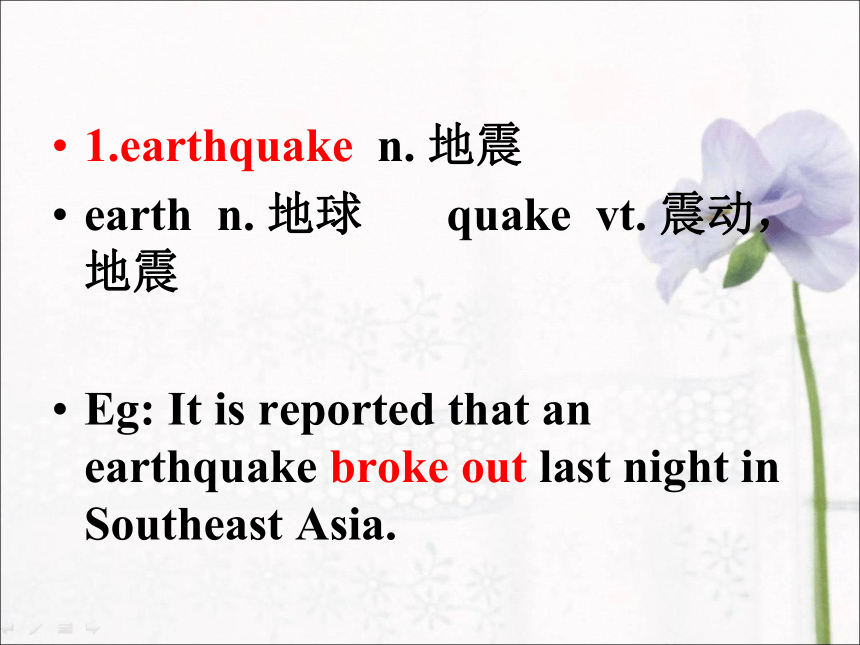
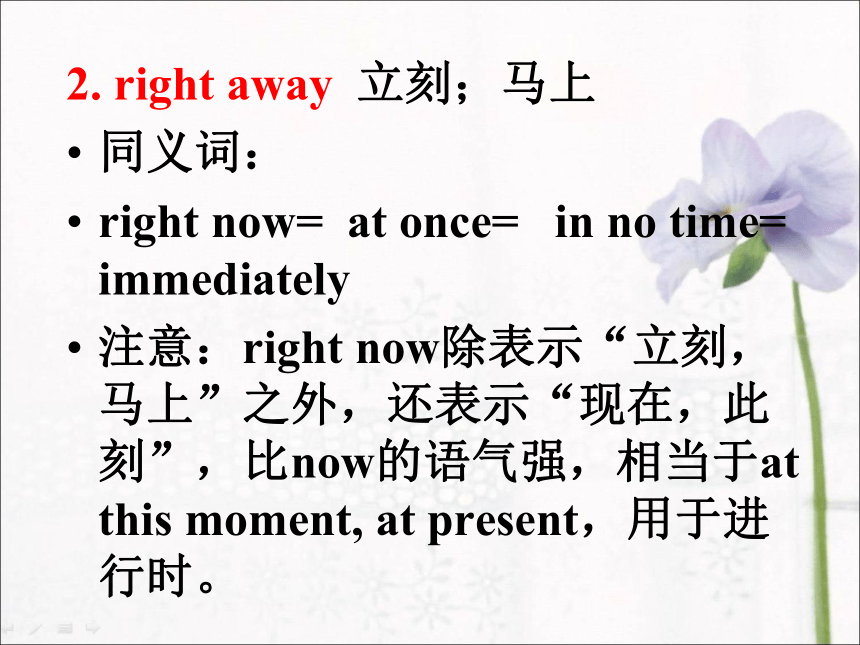


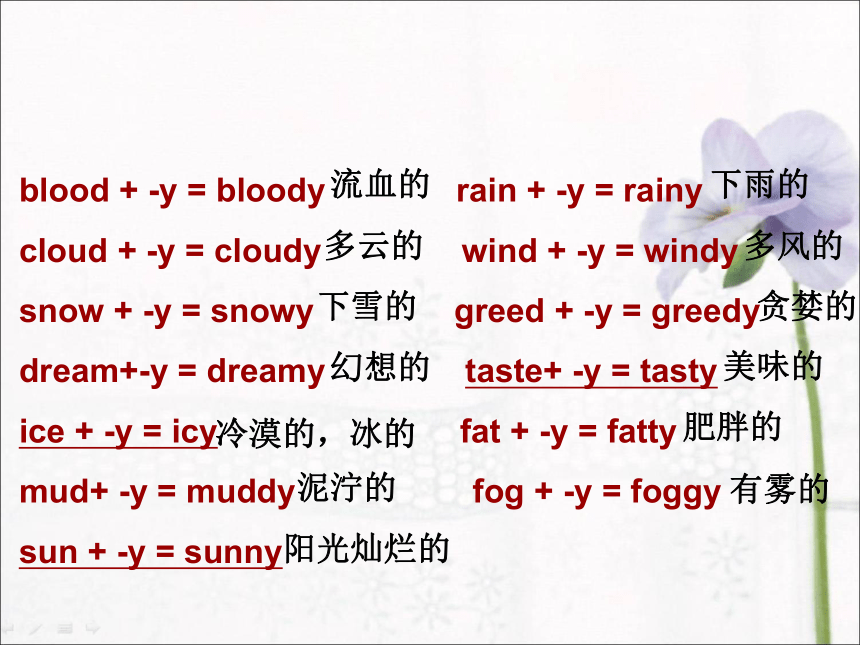
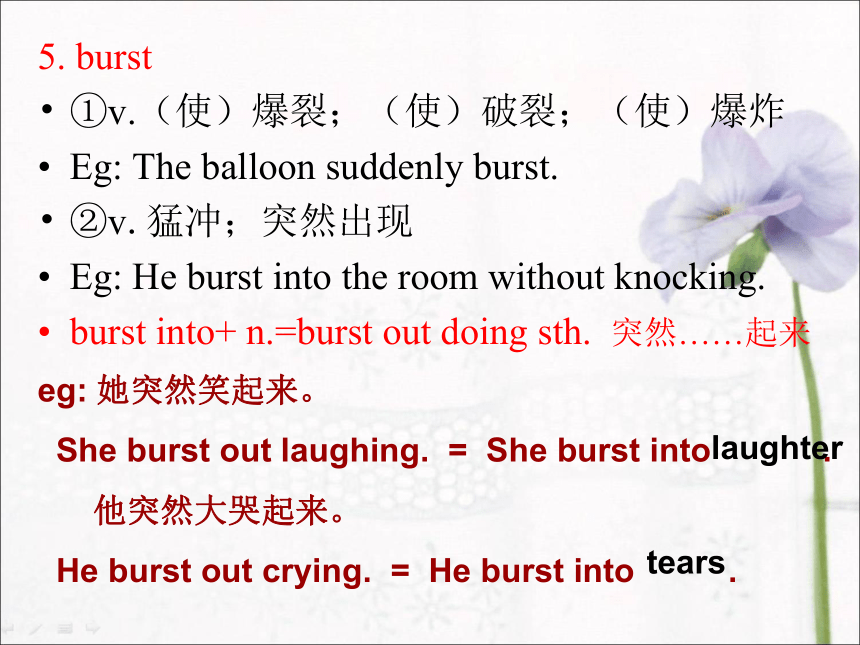
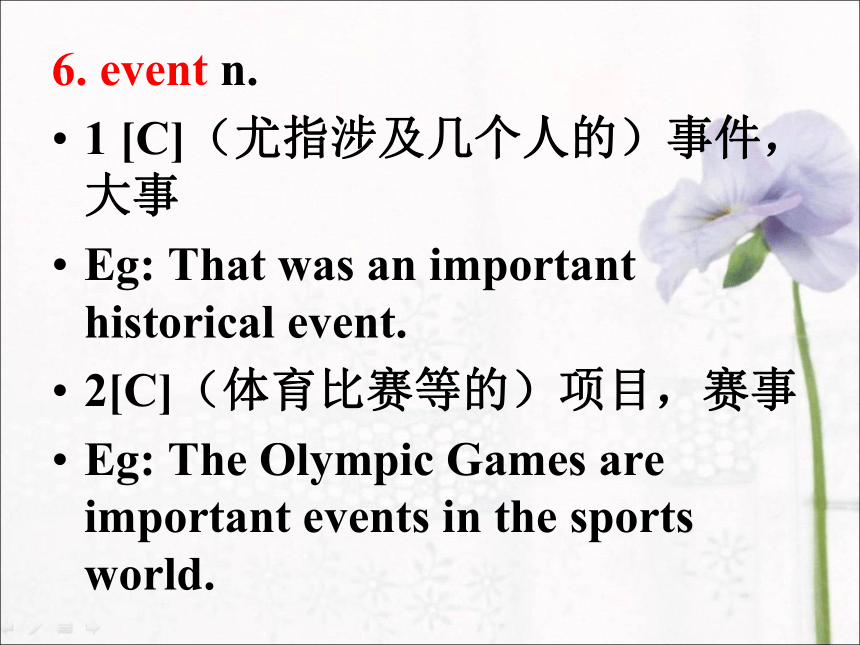
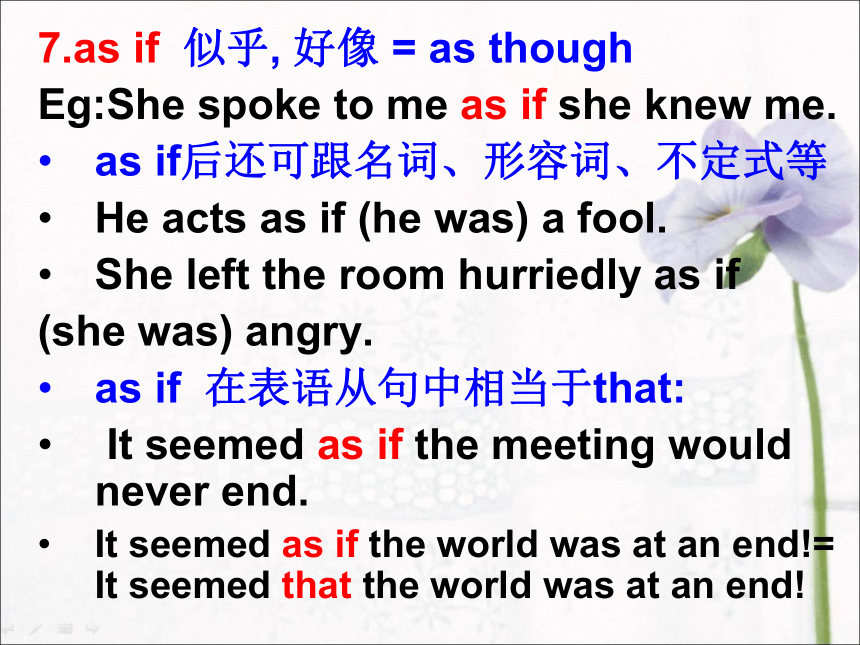
文档简介
(共28张PPT)
Unit4
Earthquakes
1.earthquake
n.
地震
earth
n.
地球
quake
vt.
震动,地震
Eg:
It
is
reported
that
an
earthquake
broke
out
last
night
in
Southeast
Asia.
2.
right
away
立刻;马上
同义词:
right
now=
at
once=
in
no
time=
immediately
注意:right
now除表示“立刻,马上”之外,还表示“现在,此刻”,比now的语气强,相当于at
this
moment,
at
present,用于进行时。
3.
well
①
n.
井
Eg:
A
book
is
a
well
of
knowledge.
②
adj.
健康的
Eg:
I
hope
you
will
get
well
soon.
③
adv.
熟练地,有效地
Eg:
He
plays
the
piano
very
well
for
his
age.
4.
smelly
adj.
有臭味的,发臭的
Eg:
His
socks
are
smelly.
词根:smell
可用作系动词或实义动词,用作系动词时,意为“闻起来”;用作实义动词时意为“闻”
Eg:
You
may
smell
the
mixture
and
it
smells
terrible.
blood
+
-y
=
bloody
rain
+
-y
=
rainy
cloud
+
-y
=
cloudy
wind
+
-y
=
windy
snow
+
-y
=
snowy
greed
+
-y
=
greedy
dream+-y
=
dreamy
taste+
-y
=
tasty
ice
+
-y
=
icy
fat
+
-y
=
fatty
mud+
-y
=
muddy
fog
+
-y
=
foggy
sun
+
-y
=
sunny
流血的
多云的
下雪的
幻想的
冷漠的,冰的
泥泞的
肥胖的
下雨的
多风的
贪婪的
美味的
阳光灿烂的
有雾的
5.
burst
①v.(使)爆裂;(使)破裂;(使)爆炸
Eg:
The
balloon
suddenly
burst.
②v.猛冲;突然出现
Eg:
He
burst
into
the
room
without
knocking.
burst
into+
n.=burst
out
doing
sth.
突然……起来
eg:
她突然笑起来。
She
burst
out
laughing.
=
She
burst
into
.
他突然大哭起来。
He
burst
out
crying.
=
He
burst
into
.
laughter
tears
6.
event
n.
1
[C](尤指涉及几个人的)事件,大事
Eg:
That
was
an
important
historical
event.
2[C](体育比赛等的)项目,赛事
Eg:
The
Olympic
Games
are
important
events
in
the
sports
world.
7.as
if
似乎,
好像
=
as
though
Eg:She
spoke
to
me
as
if
she
knew
me.
as
if后还可跟名词、形容词、不定式等
He
acts
as
if
(he
was)
a
fool.
She
left
the
room
hurriedly
as
if
(she
was)
angry.
as
if
在表语从句中相当于that:
It
seemed
as
if
the
meeting
would
never
end.
It
seemed
as
if
the
world
was
at
an
end!=
It
seemed
that
the
world
was
at
an
end!
8.
at
an
end
结束,终结
eg:
炎热的天气终于结束了。
The
hot
days
are
at
last
at
an
end.
The
hot
days
come
to
an
end
at
last.
be
at
an
end
=
come
to
an
end
结束
辨析:at
an
end,
in
the
end,
at
the
end
of,
by
the
end
of
1).
at
an
end:
表示“终结,结束”,与be动词连用。
eg:The
war
was
at
an
end.=
The
war
came
to
an
end.
2).
in
the
end:
表示“最终,终于”,单独使用作状语。
eg:
They
gave
up
the
plan
in
the
end.
(at
last)
3).
at
the
end
of:
表示“在…的尽头/末尾”
eg:
My
father
will
come
home
at
the
end
of
this
year.
4).
by
the
end
of:
到…末为止,常与完成时态连用。
by
the
end
of
last…用于过去完成时
by
the
end
of
next…用于将来完成时
eg:
到上个月末为止,他在那条船上已经待了两年。
By
the
end
of
last
month,
he
had
been
on
that
ship
for
two
years.
到下学期末为止,我将学会3000多个英语单词。
I
will
have
learned
more
than
3000
English
words
by
the
end
of
next
term.
8.
ruin
n.
[U]
毁坏;毁灭;灭亡
n.
倒塌的建筑物,废墟
Eg:
The
castle
now
is
in
ruins.
注意:ruin表示“废墟,遗迹”,常用复数,常构成in
ruins,意为“严重受损,破败不堪”,强调状态,常用作表语或状语。
(3)v.
(完全地)毁坏,毁掉;使破产
Eg:
I
was
ruined
by
that
news.
拓展:
bring
sth
to
ruin
使某物毁灭
bring
sb
to
ruin
使某人破产
9.
extreme
(1)adj.
极度(大)的;严重的;极端的;过分的
Eg:
Boys
always
like
extreme
sports
拓展:
extremely
adv.极端地;?非常,很;
Eg:
My
mobile
phone
is
extremely
useful.
2.An
accident
his
left
eye.
4.I
don’t
want
to
you.。
1.The
soldier
was
badly.
3.Smoking
seriously
his
health.
10.
辨析:injure,
hurt,
wound,
和harm
wounded
injured
harmed
hurt
11.
track
(1)n.
[C]
足迹,踪迹;轨道,跑道
Eg:
We
followed
the
bear’s
tracks
in
the
snow.
(2)
vt.
跟踪,追踪
Eg:
We
continued
tracking
the
bear’s
track.
12.
useless
adj.
无用的,无效的,无价值的
Eg:
He
knew
it
was
useless
to
protest.
固定句式:
It
is
useless
(no
use)
doing
sth.
做某事是无用的
it
is
no
good
doing
sth.
做某事是不好的
It
is
no
use
crying
over
spilt
milk.
覆水难收
It
is
no
good
copy
other’s
homework.
13.
shock
v.
使震惊;使惊愕;使难以置信
搭配:
be
shocked
at
对……感到震惊
be
shocked
to
do
sth
惧怕做某事
eg:
I
am
shocked
at
the
bad
news.
搭配:be
a
shock
to
sb
对某人来说是一个打击
eg:
It
was
a
real
shock
to
me
that
the
school
would
have
to
close.
14.
rescue
(1)
n.
[C,U]
救援,营救;救援行动
eg:
The
rescue
team
made
ten
rescues
in
a
week.
(2)
vt.
救援,拯救,解救
搭配:rescue
sb/sth
from
把……从……(地方)解救出来
eg:
They
rescued
the
boy
from
the
burning
house.
15.
trap
(1)
vt.
(trapped)困住,关住,使陷入危险中
搭配:be
trapped
in
困在……中
eg:
The
car
was
trapped
in
the
deep
snow.
(2)
n.
[C]陷阱;困境;圈套,诡计
eg:
She
had
set
a
trap
for
him
and
he
had
walked
straight
into
it.
16.
electricity
n.
[U]
电,电力
拓展:
turn
on/off
electricity
接通/切断电源
electric
adj.
用电的,电动的
electrical
adj.
电的,与电有关的
electronic
adj.电子的
17.
disaster
n.
灾难,灾祸
Eg:
The
fire
was
a
great
disaster.
拓展:
natural
disaster
自然灾害
a
disaster
area
灾区
18.
dig
out
(dug)
挖出,翻找出
Eg:
Why
did
you
dig
out
those
old
magazines?
19.
bury
vt.
埋葬,掩埋,隐藏
eg:
She
was
buried
beside
her
husband’s
grave.
She
buried
her
face
in
her
hands
and
cried.
短语:bury
oneself
in…=be
buried
in….
专心于…,
埋首于…
devote
oneself
to…=be
devoted
to…
专心于…,献身于…
be
lost
in…
陷入…中
20.
shelter
n.
掩蔽,躲避处,避难,保护
短语:take
shelter
from…
躲避…
eg:
人们在商店躲避雨。
People
took
shelter
from
the
rain
in
the
store.
21.
damage
n.&vt.
损失,损害
eg:
Smoking
can
damage
your
health.
抽烟会损害你的健康。
短语:do
damage
to…
对…造成损害
Smoking
does
damage
to
your
health.
22.
frighten
vt.
使惊吓,吓唬
frightened
adj.
受惊的,受恐吓的
frightening
adj.
令人恐惧的
短语:
be
frightened
at…
受…惊吓
be
frightened
of
sb/sth
害怕某人/某物
We
were
frightened
when
he
fell
into
the
river.
23.congratulation
n.
祝贺;恭贺;贺词
搭配:
congratulations
to
congratulate
vt.祝贺
搭配:congratulate
sb
on
sth
Congratulate
you
on
your
success.
24.
judge
(1)n.
裁判员,评判员;法官;审判员
(2)
vt.
判断;断定;认为
Eg:
Don’t
judge
a
person
by
his
appearance
(3)vt.
裁判;评判;担任裁判
judge
是一个重要的动词,尤其要注意它所构成的分词悬垂结构judging
from/by…,它在句中做独立成分,不受句子主语的影响和限制,表达的意义是说话者的看法或判断。Judging
by
her
letter,
they
are
having
a
wonderful
time.
25.
express
vt.
表示,表达,表露
搭配:
express
sth
表达/表露
express
oneself
表达自己的思想感情
Eg:
Perhaps
I
have
not
expressed
myself
very
well.
Unit4
Earthquakes
1.earthquake
n.
地震
earth
n.
地球
quake
vt.
震动,地震
Eg:
It
is
reported
that
an
earthquake
broke
out
last
night
in
Southeast
Asia.
2.
right
away
立刻;马上
同义词:
right
now=
at
once=
in
no
time=
immediately
注意:right
now除表示“立刻,马上”之外,还表示“现在,此刻”,比now的语气强,相当于at
this
moment,
at
present,用于进行时。
3.
well
①
n.
井
Eg:
A
book
is
a
well
of
knowledge.
②
adj.
健康的
Eg:
I
hope
you
will
get
well
soon.
③
adv.
熟练地,有效地
Eg:
He
plays
the
piano
very
well
for
his
age.
4.
smelly
adj.
有臭味的,发臭的
Eg:
His
socks
are
smelly.
词根:smell
可用作系动词或实义动词,用作系动词时,意为“闻起来”;用作实义动词时意为“闻”
Eg:
You
may
smell
the
mixture
and
it
smells
terrible.
blood
+
-y
=
bloody
rain
+
-y
=
rainy
cloud
+
-y
=
cloudy
wind
+
-y
=
windy
snow
+
-y
=
snowy
greed
+
-y
=
greedy
dream+-y
=
dreamy
taste+
-y
=
tasty
ice
+
-y
=
icy
fat
+
-y
=
fatty
mud+
-y
=
muddy
fog
+
-y
=
foggy
sun
+
-y
=
sunny
流血的
多云的
下雪的
幻想的
冷漠的,冰的
泥泞的
肥胖的
下雨的
多风的
贪婪的
美味的
阳光灿烂的
有雾的
5.
burst
①v.(使)爆裂;(使)破裂;(使)爆炸
Eg:
The
balloon
suddenly
burst.
②v.猛冲;突然出现
Eg:
He
burst
into
the
room
without
knocking.
burst
into+
n.=burst
out
doing
sth.
突然……起来
eg:
她突然笑起来。
She
burst
out
laughing.
=
She
burst
into
.
他突然大哭起来。
He
burst
out
crying.
=
He
burst
into
.
laughter
tears
6.
event
n.
1
[C](尤指涉及几个人的)事件,大事
Eg:
That
was
an
important
historical
event.
2[C](体育比赛等的)项目,赛事
Eg:
The
Olympic
Games
are
important
events
in
the
sports
world.
7.as
if
似乎,
好像
=
as
though
Eg:She
spoke
to
me
as
if
she
knew
me.
as
if后还可跟名词、形容词、不定式等
He
acts
as
if
(he
was)
a
fool.
She
left
the
room
hurriedly
as
if
(she
was)
angry.
as
if
在表语从句中相当于that:
It
seemed
as
if
the
meeting
would
never
end.
It
seemed
as
if
the
world
was
at
an
end!=
It
seemed
that
the
world
was
at
an
end!
8.
at
an
end
结束,终结
eg:
炎热的天气终于结束了。
The
hot
days
are
at
last
at
an
end.
The
hot
days
come
to
an
end
at
last.
be
at
an
end
=
come
to
an
end
结束
辨析:at
an
end,
in
the
end,
at
the
end
of,
by
the
end
of
1).
at
an
end:
表示“终结,结束”,与be动词连用。
eg:The
war
was
at
an
end.=
The
war
came
to
an
end.
2).
in
the
end:
表示“最终,终于”,单独使用作状语。
eg:
They
gave
up
the
plan
in
the
end.
(at
last)
3).
at
the
end
of:
表示“在…的尽头/末尾”
eg:
My
father
will
come
home
at
the
end
of
this
year.
4).
by
the
end
of:
到…末为止,常与完成时态连用。
by
the
end
of
last…用于过去完成时
by
the
end
of
next…用于将来完成时
eg:
到上个月末为止,他在那条船上已经待了两年。
By
the
end
of
last
month,
he
had
been
on
that
ship
for
two
years.
到下学期末为止,我将学会3000多个英语单词。
I
will
have
learned
more
than
3000
English
words
by
the
end
of
next
term.
8.
ruin
n.
[U]
毁坏;毁灭;灭亡
n.
倒塌的建筑物,废墟
Eg:
The
castle
now
is
in
ruins.
注意:ruin表示“废墟,遗迹”,常用复数,常构成in
ruins,意为“严重受损,破败不堪”,强调状态,常用作表语或状语。
(3)v.
(完全地)毁坏,毁掉;使破产
Eg:
I
was
ruined
by
that
news.
拓展:
bring
sth
to
ruin
使某物毁灭
bring
sb
to
ruin
使某人破产
9.
extreme
(1)adj.
极度(大)的;严重的;极端的;过分的
Eg:
Boys
always
like
extreme
sports
拓展:
extremely
adv.极端地;?非常,很;
Eg:
My
mobile
phone
is
extremely
useful.
2.An
accident
his
left
eye.
4.I
don’t
want
to
you.。
1.The
soldier
was
badly.
3.Smoking
seriously
his
health.
10.
辨析:injure,
hurt,
wound,
和harm
wounded
injured
harmed
hurt
11.
track
(1)n.
[C]
足迹,踪迹;轨道,跑道
Eg:
We
followed
the
bear’s
tracks
in
the
snow.
(2)
vt.
跟踪,追踪
Eg:
We
continued
tracking
the
bear’s
track.
12.
useless
adj.
无用的,无效的,无价值的
Eg:
He
knew
it
was
useless
to
protest.
固定句式:
It
is
useless
(no
use)
doing
sth.
做某事是无用的
it
is
no
good
doing
sth.
做某事是不好的
It
is
no
use
crying
over
spilt
milk.
覆水难收
It
is
no
good
copy
other’s
homework.
13.
shock
v.
使震惊;使惊愕;使难以置信
搭配:
be
shocked
at
对……感到震惊
be
shocked
to
do
sth
惧怕做某事
eg:
I
am
shocked
at
the
bad
news.
搭配:be
a
shock
to
sb
对某人来说是一个打击
eg:
It
was
a
real
shock
to
me
that
the
school
would
have
to
close.
14.
rescue
(1)
n.
[C,U]
救援,营救;救援行动
eg:
The
rescue
team
made
ten
rescues
in
a
week.
(2)
vt.
救援,拯救,解救
搭配:rescue
sb/sth
from
把……从……(地方)解救出来
eg:
They
rescued
the
boy
from
the
burning
house.
15.
trap
(1)
vt.
(trapped)困住,关住,使陷入危险中
搭配:be
trapped
in
困在……中
eg:
The
car
was
trapped
in
the
deep
snow.
(2)
n.
[C]陷阱;困境;圈套,诡计
eg:
She
had
set
a
trap
for
him
and
he
had
walked
straight
into
it.
16.
electricity
n.
[U]
电,电力
拓展:
turn
on/off
electricity
接通/切断电源
electric
adj.
用电的,电动的
electrical
adj.
电的,与电有关的
electronic
adj.电子的
17.
disaster
n.
灾难,灾祸
Eg:
The
fire
was
a
great
disaster.
拓展:
natural
disaster
自然灾害
a
disaster
area
灾区
18.
dig
out
(dug)
挖出,翻找出
Eg:
Why
did
you
dig
out
those
old
magazines?
19.
bury
vt.
埋葬,掩埋,隐藏
eg:
She
was
buried
beside
her
husband’s
grave.
She
buried
her
face
in
her
hands
and
cried.
短语:bury
oneself
in…=be
buried
in….
专心于…,
埋首于…
devote
oneself
to…=be
devoted
to…
专心于…,献身于…
be
lost
in…
陷入…中
20.
shelter
n.
掩蔽,躲避处,避难,保护
短语:take
shelter
from…
躲避…
eg:
人们在商店躲避雨。
People
took
shelter
from
the
rain
in
the
store.
21.
damage
n.&vt.
损失,损害
eg:
Smoking
can
damage
your
health.
抽烟会损害你的健康。
短语:do
damage
to…
对…造成损害
Smoking
does
damage
to
your
health.
22.
frighten
vt.
使惊吓,吓唬
frightened
adj.
受惊的,受恐吓的
frightening
adj.
令人恐惧的
短语:
be
frightened
at…
受…惊吓
be
frightened
of
sb/sth
害怕某人/某物
We
were
frightened
when
he
fell
into
the
river.
23.congratulation
n.
祝贺;恭贺;贺词
搭配:
congratulations
to
congratulate
vt.祝贺
搭配:congratulate
sb
on
sth
Congratulate
you
on
your
success.
24.
judge
(1)n.
裁判员,评判员;法官;审判员
(2)
vt.
判断;断定;认为
Eg:
Don’t
judge
a
person
by
his
appearance
(3)vt.
裁判;评判;担任裁判
judge
是一个重要的动词,尤其要注意它所构成的分词悬垂结构judging
from/by…,它在句中做独立成分,不受句子主语的影响和限制,表达的意义是说话者的看法或判断。Judging
by
her
letter,
they
are
having
a
wonderful
time.
25.
express
vt.
表示,表达,表露
搭配:
express
sth
表达/表露
express
oneself
表达自己的思想感情
Eg:
Perhaps
I
have
not
expressed
myself
very
well.
